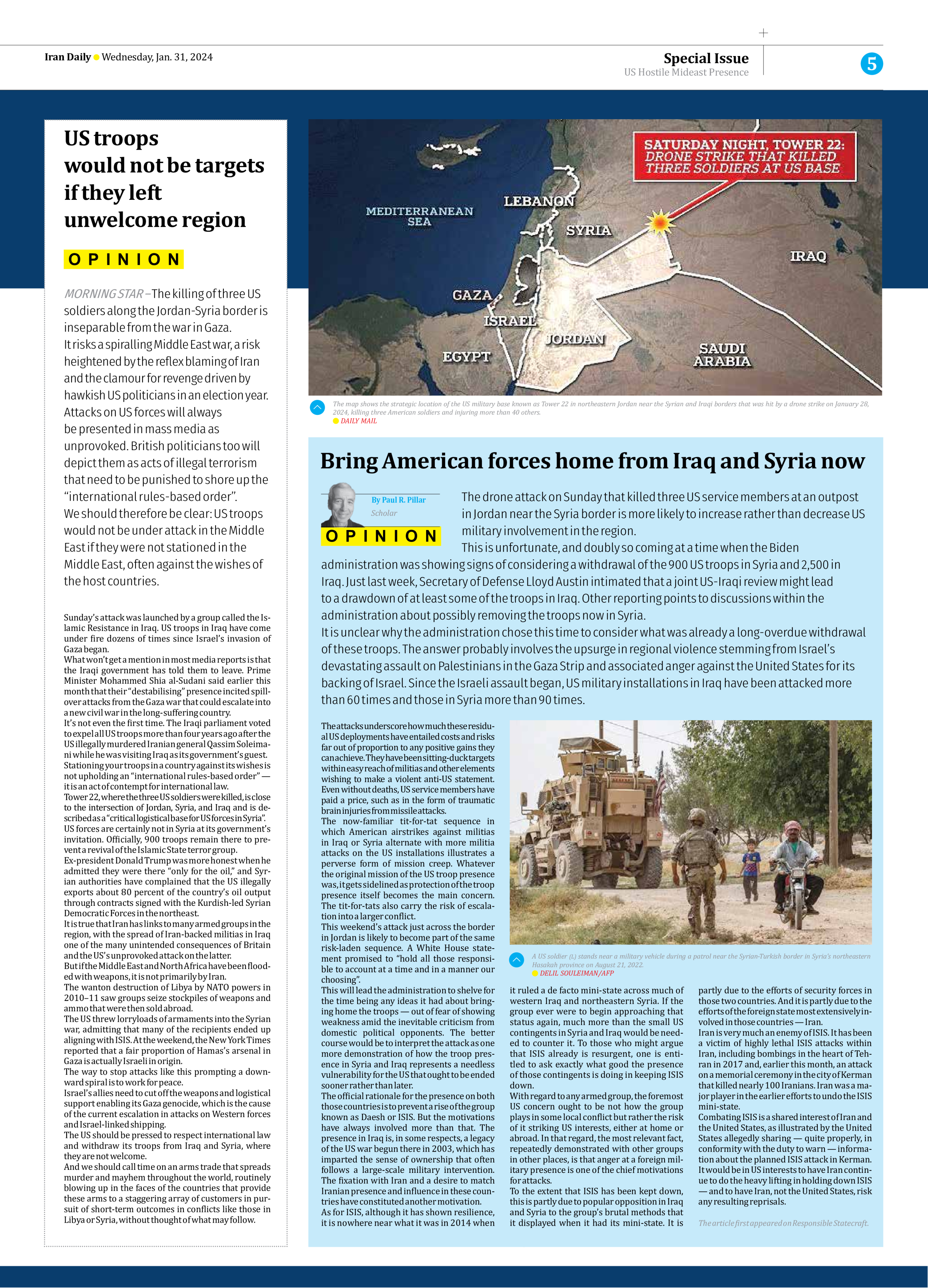
US troops would not be targets if they left unwelcome region
MORNING STAR – The killing of three US soldiers along the Jordan-Syria border is inseparable from the war in Gaza.
It risks a spiralling Middle East war, a risk heightened by the reflex blaming of Iran and the clamour for revenge driven by hawkish US politicians in an election year.
Attacks on US forces will always be presented in mass media as unprovoked. British politicians too will depict them as acts of illegal terrorism that need to be punished to shore up the “international rules-based order”.
We should therefore be clear: US troops would not be under attack in the Middle East if they were not stationed in the Middle East, often against the wishes of the host countries.
Sunday’s attack was launched by a group called the Islamic Resistance in Iraq. US troops in Iraq have come under fire dozens of times since Israel’s invasion of Gaza began.
What won’t get a mention in most media reports is that the Iraqi government has told them to leave. Prime Minister Mohammed Shia al-Sudani said earlier this month that their “destabilising” presence incited spillover attacks from the Gaza war that could escalate into a new civil war in the long-suffering country.
It’s not even the first time. The Iraqi parliament voted to expel all US troops more than four years ago after the US illegally murdered Iranian general Qassim Soleimani while he was visiting Iraq as its government’s guest.
Stationing your troops in a country against its wishes is not upholding an “international rules-based order” — it is an act of contempt for international law.
Tower 22, where the three US soldiers were killed, is close to the intersection of Jordan, Syria, and Iraq and is described as a “critical logistical base for US forces in Syria”.
US forces are certainly not in Syria at its government’s invitation. Officially, 900 troops remain there to prevent a revival of the Islamic State terror group.
Ex-president Donald Trump was more honest when he admitted they were there “only for the oil,” and Syrian authorities have complained that the US illegally exports about 80 percent of the country’s oil output through contracts signed with the Kurdish-led Syrian Democratic Forces in the northeast.
It is true that Iran has links to many armed groups in the region, with the spread of Iran-backed militias in Iraq one of the many unintended consequences of Britain and the US’s unprovoked attack on the latter.
But if the Middle East and North Africa have been flooded with weapons, it is not primarily by Iran.
The wanton destruction of Libya by NATO powers in 2010–11 saw groups seize stockpiles of weapons and ammo that were then sold abroad.
The US threw lorryloads of armaments into the Syrian war, admitting that many of the recipients ended up aligning with ISIS. At the weekend, the New York Times reported that a fair proportion of Hamas’s arsenal in Gaza is actually Israeli in origin.
The way to stop attacks like this prompting a downward spiral is to work for peace.
Israel’s allies need to cut off the weapons and logistical support enabling its Gaza genocide, which is the cause of the current escalation in attacks on Western forces and Israel-linked shipping.
The US should be pressed to respect international law and withdraw its troops from Iraq and Syria, where they are not welcome.
And we should call time on an arms trade that spreads murder and mayhem throughout the world, routinely blowing up in the faces of the countries that provide these arms to a staggering array of customers in pursuit of short-term outcomes in conflicts like those in Libya or Syria, without thought of what may follow.







